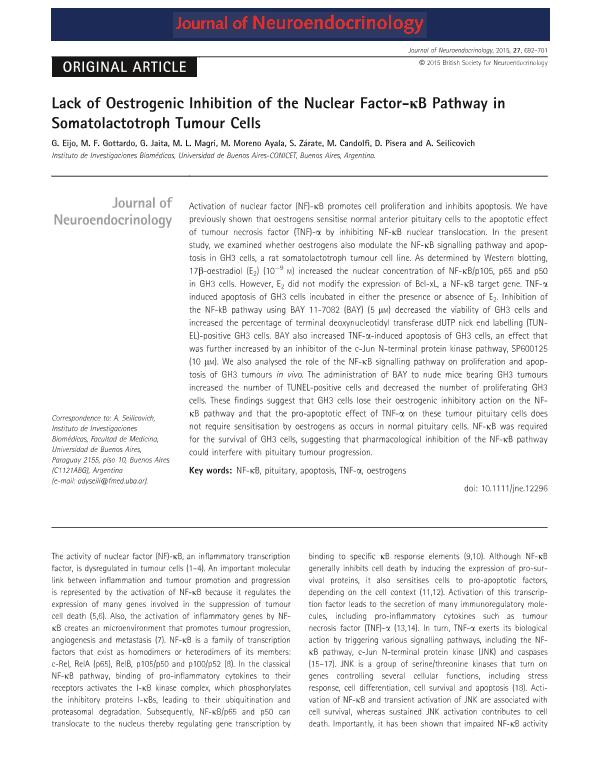Artículo
Lack of oestrogenic inhibition of the nuclear factor-κB pathway in somatolactotroph tumour cells
Eijo Alvarenga, Stella Guadalupe ; Gottardo, María Florencia
; Gottardo, María Florencia ; Jaita, Gabriela Alejandra
; Jaita, Gabriela Alejandra ; Magri, María Laura
; Magri, María Laura ; Moreno Ayala, Mariela Alejandra
; Moreno Ayala, Mariela Alejandra ; Zarate, Sandra Cristina
; Zarate, Sandra Cristina ; Candolfi, Marianela
; Candolfi, Marianela ; Pisera, Daniel Alberto
; Pisera, Daniel Alberto ; Seilicovich, Adriana
; Seilicovich, Adriana
 ; Gottardo, María Florencia
; Gottardo, María Florencia ; Jaita, Gabriela Alejandra
; Jaita, Gabriela Alejandra ; Magri, María Laura
; Magri, María Laura ; Moreno Ayala, Mariela Alejandra
; Moreno Ayala, Mariela Alejandra ; Zarate, Sandra Cristina
; Zarate, Sandra Cristina ; Candolfi, Marianela
; Candolfi, Marianela ; Pisera, Daniel Alberto
; Pisera, Daniel Alberto ; Seilicovich, Adriana
; Seilicovich, Adriana
Fecha de publicación:
09/2015
Editorial:
Wiley
Revista:
Journal Of Neuroendocrinology
ISSN:
0953-8194
e-ISSN:
1365-2826
Idioma:
Inglés
Tipo de recurso:
Artículo publicado
Clasificación temática:
Resumen
Activation of nuclear factor (NF)-κB promotes cell proliferation and inhibits apoptosis. We have previously shown that oestrogens sensitise normal anterior pituitary cells to the apoptotic effect of tumour necrosis factor (TNF)-α by inhibiting NF-κB nuclear translocation. In the present study, we examined whether oestrogens also modulate the NF-κB signalling pathway and apoptosis in GH3 cells, a rat somatolactotroph tumour cell line. As determined by Western blotting, 17β-oestradiol (E2) (10−9 m) increased the nuclear concentration of NF-κB/p105, p65 and p50 in GH3 cells. However, E2 did not modify the expression of Bcl-xL, a NF-κB target gene. TNF-α induced apoptosis of GH3 cells incubated in either the presence or absence of E2. Inhibition of the NF-kB pathway using BAY 11-7082 (BAY) (5 μm) decreased the viability of GH3 cells and increased the percentage of terminal deoxynucleotidyl transferase dUTP nick end labelling (TUNEL)-positive GH3 cells. BAY also increased TNF-α-induced apoptosis of GH3 cells, an effect that was further increased by an inhibitor of the c-Jun N-terminal protein kinase pathway, SP600125 (10 μm). We also analysed the role of the NF-κB signalling pathway on proliferation and apoptosis of GH3 tumours in vivo. The administration of BAY to nude mice bearing GH3 tumours increased the number of TUNEL-positive cells and decreased the number of proliferating GH3 cells. These findings suggest that GH3 cells lose their oestrogenic inhibitory action on the NF-κB pathway and that the pro-apoptotic effect of TNF-α on these tumour pituitary cells does not require sensitisation by oestrogens as occurs in normal pituitary cells. NF-κB was required for the survival of GH3 cells, suggesting that pharmacological inhibition of the NF-κB pathway could interfere with pituitary tumour progression.
Palabras clave:
Apoptosis
,
Nf-Kb
,
Oestrogens
,
Pituitary
Archivos asociados
Licencia
Identificadores
Colecciones
Articulos(BIOMED)
Articulos de INSTITUTO DE INVESTIGACIONES BIOMEDICAS
Articulos de INSTITUTO DE INVESTIGACIONES BIOMEDICAS
Articulos(INBIOMED)
Articulos de INSTITUTO DE INVESTIGACIONES BIOMEDICAS
Articulos de INSTITUTO DE INVESTIGACIONES BIOMEDICAS
Citación
Eijo Alvarenga, Stella Guadalupe; Gottardo, María Florencia; Jaita, Gabriela Alejandra; Magri, María Laura; Moreno Ayala, Mariela Alejandra; et al.; Lack of oestrogenic inhibition of the nuclear factor-κB pathway in somatolactotroph tumour cells; Wiley; Journal Of Neuroendocrinology; 27; 9; 9-2015; 692-701
Compartir
Altmétricas



